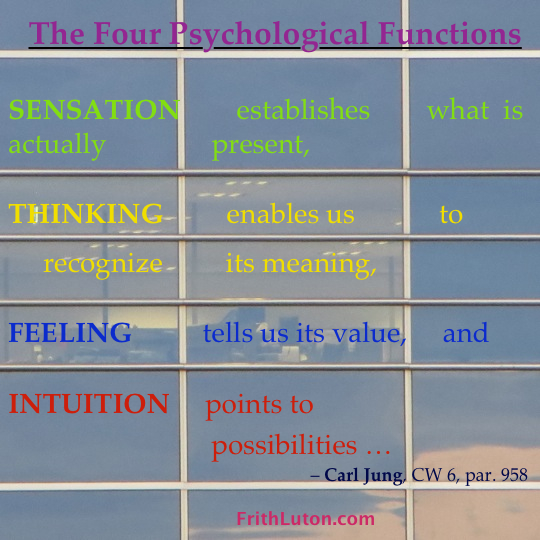Function
A form of psychic activity, or manifestation of libido, that remains the same in principle under varying conditions. (See also differentiation, inferior, primary and auxiliary functions, and typology.)
Jung’s model of typology distinguishes four psychological functions: thinking, feeling, sensation and intuition.
Sensation establishes what is actually present, thinking enables us to recognize its meaning, feeling tells us its value, and intuition points to possibilities as to whence it came and whither it is going in a given situation. [“A Psychological Theory of Types,” CW 6, par. 958.]
Though all the functions exist in every psyche, one function is invariably more consciously developed than the others, giving rise to a one-sidedness that often leads to neurosis.
The more [a man] identifies with one function, the more he invests it with libido, and the more he withdraws libido from the other functions. They can tolerate being deprived of libido for even quite long periods, but in the end they will react. Being drained of libido, they gradually sink below the threshold of consciousness, lose their associative connection with it, and finally lapse into the unconscious. This is a regressive development, a reversion to the infantile and finally to the archaic level … [which] brings about a dissociation of the personality. [“The Type Problem in Aesthetics,” ibid., pars. 502f.]
Differentiation
The separation of parts from a whole, necessary for conscious access to the psychological functions.
So long as a function is still so fused with one or more other functions – thinking with feeling, feeling with sensation, etc. – that it is unable to operate on its own, it is in an archaic condition, i.e., not differentiated, not separated from the whole as a special part and existing by itself. Undifferentiated thinking is incapable of thinking apart from other functions; it is continually mixed up with sensations, feelings, intuitions, just as undifferentiated feeling is mixed up with sensations and fantasies. [“Definitions,” CW 6, par. 705.]
An undifferentiated function is characterized by ambivalence (every position entails its own negative), which leads to characteristic inhibitions in its use.
Differentiation consists in the separation of the function from other functions, and in the separation of its individual parts from each other. Without differentiation direction is impossible, since the direction of a function towards a goal depends on the elimination of anything irrelevant. Fusion with the irrelevant precludes direction; only a differentiated function is capable of being directed. [Ibid., par. 705.]
© from Daryl Sharp’s Jung Lexicon, reproduced with kind permission of the author.
